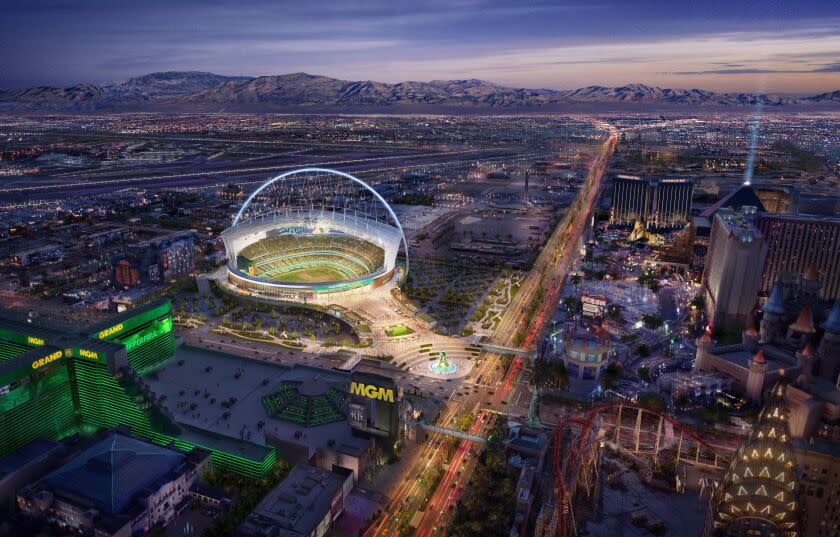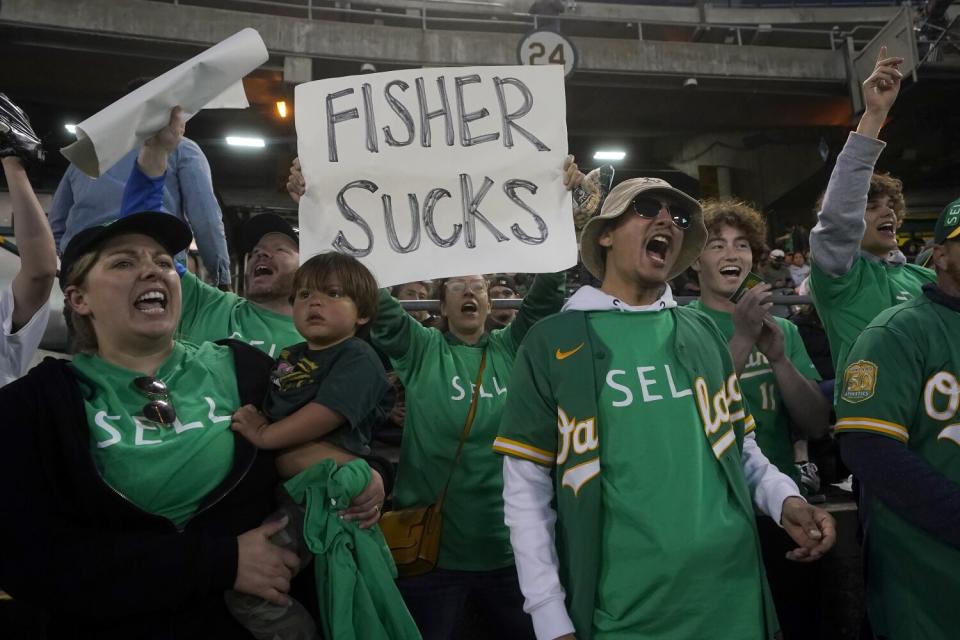Shaikin: Athletics owners are failing on Las Vegas move. It's time for Rob Manfred to act

It’s hard to tell whether the Oakland Athletics are a bigger farce on or off the field.
On the field, the A’s are on pace to lose 127 games. No major league team in the entirety of the 20th century lost so many games in a single season.
Off the field, the A’s soon could go 0 for 4 in potential host cities, striking out in the pursuit of a new ballpark in Oakland, Fremont, San Jose and maybe now in Las Vegas.
The question is not where A’s owner John Fisher and team president Dave Kaval might look next. The question is why Major League Baseball commissioner Rob Manfred would trust them to wrap up the Vegas deal, let alone let them look for another stadium deal, when Fisher and Kaval have proven they cannot get a deal done.
MLB wants the Vegas deal done.
For two decades, the A’s have pitched a new ballpark as a panacea. In 2009, long before Fisher and Kaval and Manfred were the faces attached to this saga, then-commissioner Bud Selig said this: “The A’s cannot and will not continue indefinitely in their current situation.” (Narrator: They can, and they have.)
Here is Manfred, his successor, in 2021: “The Oakland process is at an end.”
Here is Manfred, in July 2022: “It needs to happen now. It needs to be done.”
Here is Manfred, in December 2022: “We’re past any reasonable timeline for the situation in Oakland to be resolved.”
Maybe Oakland was the issue. Or, as it turns out, maybe not.
In April, Fisher and Kaval said they would make a deal in Las Vegas. The deal was supposed to have been done by Monday. Or Tuesday. Or Wednesday.
Or, at least, sometime before major league owners meet next Tuesday.
Now? They're still working on it, a process marked by ineptitude so prolonged and so public that Oakland congresswoman Barbara Lee this week found time to write Manfred and threaten baseball’s antitrust exemption.
There is a small group of specialists who negotiate stadium deals from coast to coast. I talked to one who has worked on MLB deals for years. He is not involved in the Las Vegas deal, but he is astounded at how Fisher and Kaval have failed at the basic give and take that accompanies any negotiation.
Some legislators will vote yes, no matter what. Some will vote no. But, in a public hearing Wednesday, several legislators practically pleaded for Fisher and Kaval to give them something: help us get to a yes vote, a vote that we can defend to our constituents.

One legislator asked the A’s to consider a 9% ticket tax, the same tax assessed on tickets to concerts and shows in Las Vegas.
Another legislator asked the A’s to guarantee their community benefits promises by writing them into the stadium bill.
The stadium negotiator was flabbergasted that the A’s had dodged both requests. How, he wondered, do the A’s not at least offer to discuss a smaller ticket tax? That could be a way to a yes vote, since legislators could say they got the A’s to pay a tax the Raiders and Golden Knights do not pay. Perhaps the A’s even negotiate a mechanism to recoup that money in later years.
And, when a public hearing last week revealed citizen anguish that a baseball stadium might be a higher funding priority than public schools, it should have been a no-brainer for Fisher and Kaval to say this: “We want to be a part of the solution, not a part of the problem. If we are fortunate enough to become part of this community, the A’s will donate $1 million a year to public education in Las Vegas.”
Here is what the A’s would be getting in Las Vegas: $380 million in taxpayer money toward a new stadium, plus free land for the stadium donated by a private company, plus no property taxes because the A’s would donate the land to a public agency, plus no rent because the agency would waive it, plus revenue from naming rights. That’s a half-billion dollars worth of goodies right there.
The legislature went home for the weekend, tired of waiting for the A’s to give enough to get the votes.
If there is a deal to be made — and there is — Manfred should dispatch one of those stadium negotiation specialists to Vegas this weekend and let him do the talking. Fisher and Kaval have promised new ballparks at four locations in the past six years, and two in the past six weeks. Their track record speaks for itself.
If Fisher really draws the line at his $1.1 billion contribution to the stadium, so be it. However, his team’s lease in Oakland expires next year.
The A’s might still pull victory from the jaws of defeat in Las Vegas. Or they could find themselves homeless after the 2024 season, barnstorming like the Savannah Bananas.
This story originally appeared in Los Angeles Times.

